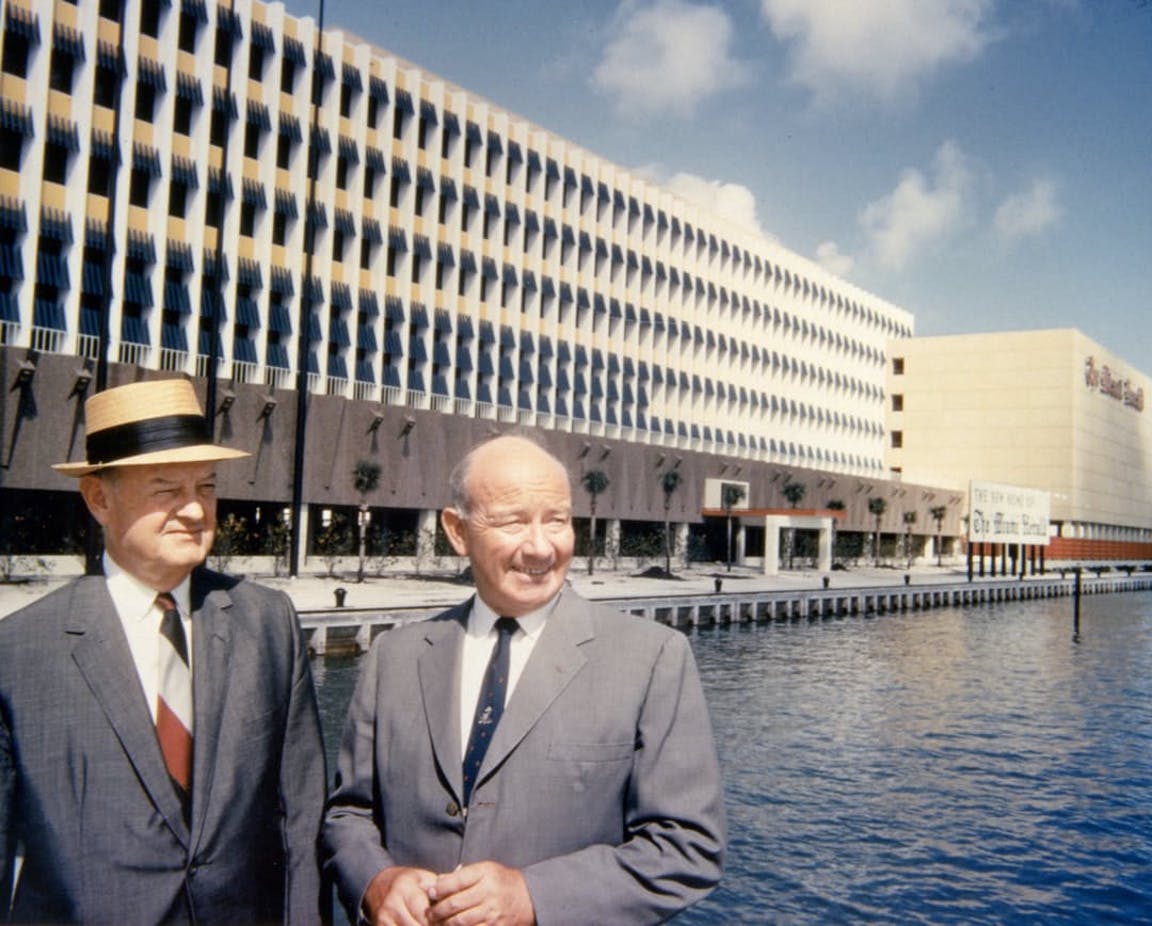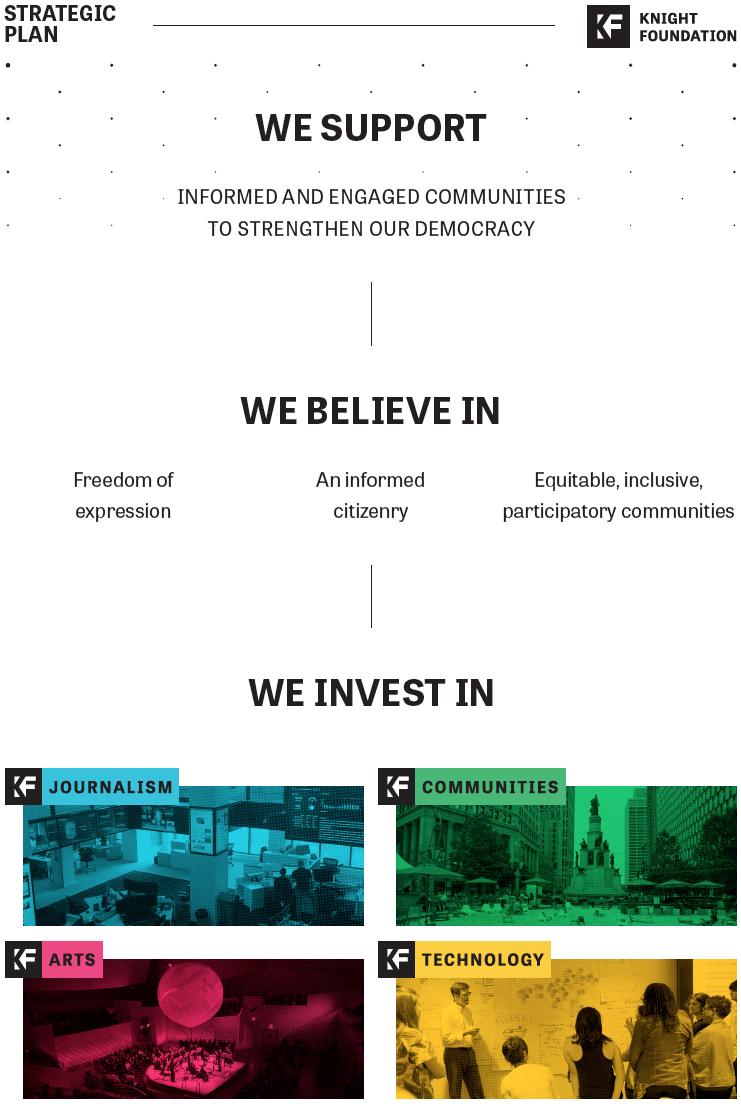
Thriving in the gray: How Knight Foundation’s strategy is evolving in the age of disruption
For years, I had a front-row seat as technology disrupted journalism’s traditions and institutions, even as it made possible the inclusion of billions of people who suddenly had the possibility of voice through social media. Over the last decade, as head of Knight Foundation, I’ve seen the evolution of media and the advent of the Internet of Everything.
Disruption rules.
Fact-based journalism now competes with false information for our attention while our cities and citizens become both more connected by technology and more divided by ideology and income. The values reflected in lines of code, whether it be at the ATM, when we search on internet or drive a car, are already affecting what we think, what we do and what information we share with those around us.
It’s an exciting, frustrating and pivotal moment in history.
As we navigate these turbulent times, we at Knight Foundation will be guided by the same core beliefs we have had for decades:
- We believe in freedom of expression and in the values expressed in the First Amendment to the Constitution of the United States.
- We believe an informed citizenry is essential for individuals and communities to make their own best choices and that journalism has a critical role to play in that democratic process.
- We believe in equitable, inclusive and participatory communities.
In late 2015, we began a process to examine the forces that will affect us and our communities in the next 10 years. We wanted to explore how we might serve our communities better, whether they be communities of geography or communities of ideas. We do not live in black and white. How might we thrive in the gray—with agility, curiosity and excitement—staying true to our core beliefs and the intent of our founders John and James Knight?

The latter was not difficult. The Knight brothers were 20th century newspaper entrepreneurs who believed informed and engaged communities were essential to a healthy democracy. They established Knight Foundation to promote journalistic excellence and the success of the communities where they published newspapers. They expected the foundation to evolve, just as their company did, notably through its embrace of technology.
Our job is to carry that vision forward, in a rapidly changing world.
At best, we can make educated guesses about the future. Over the past year, we interviewed hundreds of experts, debated and thought. Then thought some more. We evolved three plausible and very different scenarios of our world 10 years from now (we’ll publish them on our website in the next month) based on hundreds of interviews with smart people from all over the country. The scenarios are not predictions, or bets on what may come to pass. Instead, they are compilations of possible changes and disruptions. There were some clear themes – technology, economic disparity and race – that ran through all of them, and a strong signal about the need to both stay close and in touch with our communities and to remain flexible and relevant to the evolving opportunities.
Armed with these scenarios, we developed a Statement of Strategy that articulated two things: the core beliefs cited above, and a vision for our grant-making programs, which seeks to be responsive to a dynamic context.
Community and National Initiatives supports ideas that nurture talented people, enhance opportunity, and foster civic engagement throughout the 26 Knight communities. Those communities, which remain special areas of focus, give us a unique opening. They represent America in all its facets, and embracing that diversity, and discussing how we can move forward together, improves all our work.
With our Arts program, we aspire both to bind people to place – to their community and to each other – and to inspire by the sheer power of art. We open doors for individual artists and encourage institutions to engage the public in ways that are authentic to each of our cities. And we understand that technology will affect the arts every bit as much as every other part of our lives.
For our Journalism program, the challenges of protecting the First Amendment and promoting journalistic excellence have intensified. We believe informed and engaged citizens are essential to a healthy democracy, but surveys show abysmally low trust in journalism, and accurate news and information compete with half-truths and fabrications flowing through the same technology platforms. We will bring people together to debate and propose solutions to this central challenge to our democracy.
The importance of technology in our work and the growing importance of artificial intelligence is reflected in an organizational change. Our Media Innovation program is now called Technology Innovation, and it is structured to work across all three other program areas, and throughout our organization, and to explore some of the sweeping issues I’ve mentioned.
There are other changes, too. We want to continue to take risks on new ideas and new innovators, and inspire others to invest in new areas. We know that good ideas can come from anyone, anywhere. But after years of startup investing, we want to further invest in the most promising projects. We don’t know yet what some of those opportunities may look like but, in a way, nothing could be more exciting.
The central challenge of fairly and effectively informing community so that, in Jack Knight’s words, the people may determine “their true interests,” is to find common ground. That is no mean feat in an era when a handful of technology companies have more ability to influence what we know—or what we think we know—than anyone in history, when anyone can disseminate false information with speed and devastating reach, and when the stalwarts of fact-based journalism on which we’ve traditionally relied appear, in the main, to have fewer and fewer resources to apply to their mission.
We’re publishing our Statement of Strategy because we want your feedback. We want to listen and to better understand the opportunities and challenges in our communities so that our grant-making remains relevant. We are willing to learn.
If you’re willing to help, let me hear from you at [email protected]. I look forward to those conversations.
Alberto Ibargüen is president of Knight Foundation. Follow him on Twitter @ibarguen.
Recent Content
-
Artsarticle ·
-
Artsarticle ·
-
Artsarticle ·


